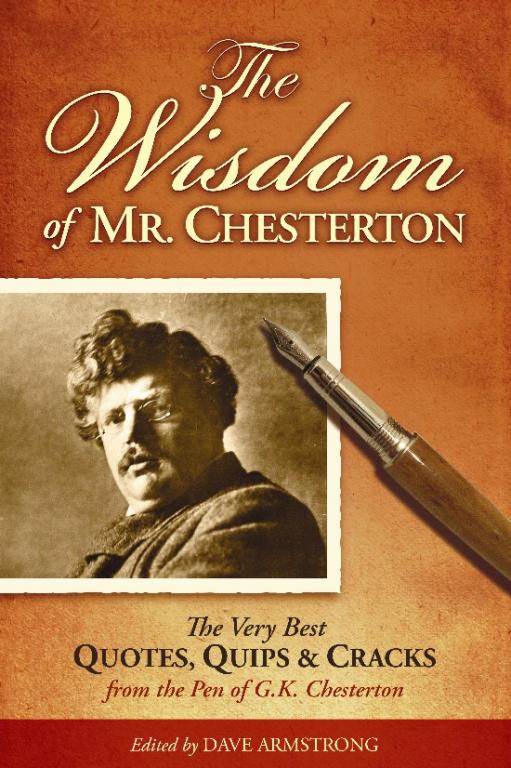
[link for more information on the book, including purchase options]
***
My book is entitled The Wisdom of Mr. Chesterton: The Very Best Quotes, Quips & Cracks from the Pen of G. K. Chesterton (Dec. 2009): a collection of quotations. I was interviewed on 3 March 2010 for the show The Catholics Next Door, hosted by Greg and Jennifer Willits, which aired on The Catholic Channel (Sirius Satellite Channel 159), from 2008-2012. I tried to find my interview in their archive of the radio show, with no success. They still have a podcast today, called Imperfect Living.
They sent me written interview questions prior to the show. Here they are, with my replies:
The Wisdom of Mr. Chesterton: The Very Best Quotes, Quips, and Cracks from the Pen of G. K. Chesterton
Publisher: Saint Benedict Press: recently merged with TAN Books; specializes in classic Catholic literature.
Basic Book Information
2100+ quotations. All single sentences, or aphorisms. From 34 non-fiction books and 229 articles written for The Illustrated London News. Organized under 281 topics, with extensive cross-referencing, indexed by source and by topic. 378 pages. GKC dates: 1874-1936.
Aphorism: a pithy, astute, proverb-like saying or maxim on a general truth. Biographer Maisie Ward: “all his paradoxes were either the startling expression of an entirely neglected truth, or the startling re-emphasis of the neglected side of a truth.”
Examples: A man’s friend likes him but leaves him as he is: his wife loves him and is always trying to turn him into somebody else.
But the new sceptic is so humble that he doubts if he can even learn.
No Catholic thinks he is a good Catholic; or he would by that thought become a bad Catholic.
Subjects Covered by Chesterton: Theology, morality, childhood, the arts, literature, science, philosophy, economic and social topics, agnosticism, education, history, politicians, everyday life, the family, and gender differences.
“How did you first get interested in GK Chesterton?”
I first heard of him as a result of my interest in C. S. Lewis, who has been my favorite writer for over thirty years (perhaps Chesterton is now!). He is often associated with Lewis, and is widely regarded as the greatest Christian apologist in the first third of the 20th century, with Lewis taking his place (in a way) in the second third of the century. An evangelical Protestant teacher at the non-denominational church I used to attend in the early 80s kept mentioning Orthodoxy as a wonderful book. I obtained a library copy around 1983 or so, and enjoyed it quite a bit. Lewis mentioned in his autobiography that The Everlasting Man was the book that influenced him the most. I had read portions of that book in the mid-80s, but didn’t read the whole thing (strangely enough) until just a few years ago. That was good, though, because the elaborate analogical reasoning he uses in the book probably would have been partially inexplicable to me earlier on.
“What books would you recommend for a new reader of GK Chesterton or for someone who wants to check out the author for the first time?”
I think Orthodoxy is the best introductory book because it is very straightforward and basic: almost the near-Catholic equivalent (in a way) of Lewis’ Mere Christianity, but with the object of explaining the necessity of tradition and orthodoxy. After that I would highly recommend What’s Wrong With the World (his social thought), St. Thomas Aquinas, and St. Francis. I’m not much of a fiction reader at all but I know that The Napoleon of Notting Hill, The Man Who Was Thursday, and the many Father Brown stories are very highly regarded.
“What compelled you to put together this book?”
I love to organize and categorize, so it was easy to collect these since all his books are online. I just cut-and-paste from the Internet versions (a lot less typing!). I wanted to share one of my favorite writers with everyone. If we love a writer, we want others to be aware of them, too, so we can share the pleasure. My favorite writers are Chesterton, C. S. Lewis, and Cardinal Newman. I have web pages about all three.
“Can you share a few favorite Chesterton quotes?”
The Christian ideal has not been tried and found wanting. It has been found difficult; and left untried.
Men have not got tired of Christianity; they have never found enough Christianity to get tired of.
(What’s Wrong With the World, 1910)
It is an almost invariable rule that the man with whom I don’t agree thinks I am making a fool of myself, and the man with whom I do agree thinks I am making a fool of him.
“What do you hope people will gain from this book?”
An appreciation for great writing, style, disagreement without hostility, the rationale for the Christian worldview, and the reasonable objections to non-Christian belief-systems.
“What do you think makes Chesterton special or unique among Catholic writers? Why is there so much interest in him by so many Catholics?”
He has extraordinary wisdom and insight combined with a certain innocence, playful wit, and joviality. He had common sense, and a very deep faith. But he wasn’t a cynic. In dashing the pretentiousness of the cynical and the prideful, he was being an idealistic and optimistic Christian. He was realistic while remaining joyful: always a very rare combination.
Chesterton’s time and place (England: early 20th century) was a lot like our own: moral relativism, agnosticism and atheism, over-emphasis on science and naturalism and the separation of faith and reason, occult and spiritualism, contraception, euthanasia, divorce, and laxity in sexual morals.
Everyone liked him, even his debate opponents. His writing is timeless. What Chesterton wrote in 1905 or 1925 is every bit as relevant today (if not more so) as anything written in the last month. Truth is truth, and doesn’t change according to fashion or the spirit of the age (zeitgeist).
Career as a Journalist He was a journalist by profession, and was not trained in theology. This is the case with almost all of the most influential apologists. C. S. Lewis and Thomas Howard were English professors. Malcolm Muggeridge was a journalist. Peter Kreeft is a philosophy professor. It enables them to write to the common man, rather than to other academics. Apologetics is about helping everyone to understand and defend Christianity, in order to live it out.
Education He attended the Slade School of Art, a department of University College, London, but never obtained a degree. He had studied English, French, History, and Political Economy, and lasted only a year in the Latin course before dropping it.
Wisdom When he wrote his book St. Thomas Aquinas in 1933 the academic Thomists (Jacques Maritain, Etienne Gilson and others) ecstatically praised it, and more than one of them said that Chesterton understood Aquinas better than they had, after 40-50 years of study. That is because Chesterton gets right down to heart of the matter or essence of any given topic: the first principles or premises.
Better-Known Books
Non-Fiction
1905 Heretics
1908 All Things Considered
1908 Orthodoxy
1910 What’s Wrong With the World
1920 The Superstition of Divorce
1924 St. Francis of Assisi
1925 The Everlasting Man
1926 The Catholic Church and Conversion
1926 The Outline of Sanity
1929 The Thing: Why I am a Catholic
1933 St. Thomas Aquinas
1935 The Well and the Shallows
1936 Autobiography
Fiction
1904 The Napoleon of Notting Hill
1905 The Club of Queer Trades
1908 The Man Who Was Thursday
1911 The Innocence of Father Brown
1914 The Wisdom of Father Brown
Representative Quotations
Abstinence
Everybody has always known about birth-control, even if it took the wild and unthinkable form of self-control.
The Bible
But it is unfair to turn round and blame the Bible because of all these legends and jokes and journalistic allusions, which are read into the Bible by people who have not read the Bible.
Children
If anybody chooses to say that I have founded all my social philosophy on the antics of a baby, I am quite satisfied to bow and smile.
Dialogue and Discussion
People generally quarrel because they cannot argue.
People do not seem to understand even the first principle of all argument: that people must agree in order to disagree.
Divorce
But the truth is that the innovators have as much sham optimism about divorce as any romanticist can have had about marriage.
The obvious effect of frivolous divorce will be frivolous marriage.
If people can be separated for no reason they will feel it all the easier to be united for no reason.
Dogmatism
The modern world is filled with men who hold dogmas so strongly that they do not even know that they are dogmas.
For the modern world will accept no dogmas upon any authority; but it will accept any dogmas on no authority.
Fashions and Fads
Anything that is fashionable is on the brink of being old-fashioned.
And the moral of it is that nothing grows old so quickly as what is new.
(Humor)
Shakespeare is quite himself; it is only some of his critics who have discovered that he was somebody else.
The very notion of always talking in terms of tomorrow is a passing taste that will soon be a thing of yesterday.
A man may be said loosely to love himself, but he can hardly fall in love with himself, or, if he does, it must be a monotonous courtship.
Incarnation
Since that day it has never been quite enough to say that God is in his heaven and all is right with the world, since the rumour that God had left his heavens to set it right.
Intelligentsia
Why is it that for the last two or three centuries the educated have been generally wrong and the uneducated relatively right?
What we call the intellectual world is divided into two types of people — those who worship the intellect and those who use it.
Reason and Logic
The difficulty is not so much to get people to follow a commandment as to get them even to follow an argument.
What is new in this matter is not so much unreason as the fact of unreason not being recognised as unreasonable.
Writers
For instance, I am staring blankly at this sheet of paper and I firmly believe that something more or less intelligible will happen soon.
Whereas, as I have only too good reason to know, if you are writing an article you can say anything that comes into your head.
+++++++++++++++++++++++++++++++++++++++++++++++++++++++++++++++++++++++++++++
Interview with Mike Davis from Aquinas and More Catholic Goods (3-12-10)
[This is a slightly edited version of the interview, published on the Musings From a Catholic Bookstore blog; entitled, “Find Out For Yourself Why There’s Such Renewed Interest in G. K. Chesterton.” Be sure to check out the books and other items from my friends at this well-known online Catholic site: Aquinas and More Catholic Gifts for Good. They have been gracious enough to strongly support my work through the years.]
*
Related Reading
G. K. Chesterton: The “Colossal Genius” (Links Page; now discontinued; see old archived versions)
Interview With Dale Ahlquist for Gilbert Magazine, Regarding My Book, The Wisdom of Mr. Chesterton [March 2010]
TV Interview: On Catholicism, Over Against Protestantism [5-1-99]
Dave Armstrong: Catholic Apologetics’ “Socratic Evangelist” (by Tim Drake; Envoy Magazine, Spring 2002)
Interview for Catholic Books and Gifts / Catholic Free Shipping [4-23-10]
My Two Conversions: Interview with Spanish Journalist Itxu Díaz [3-31-11]
* * * * *












